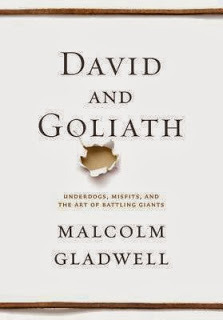David and Goliath
 I recently read David and Goliath by Malcolm Gladwell. I'm a big fan of all of Gladwell's books, but I especially enjoyed this one. It studies the success of the underdog by looking both at misconceptions about advantage and at the human tendency to succeed not despite but because of disparity. One of the chapters in this book focuses on a subject very close to me personally, dyslexia.
I recently read David and Goliath by Malcolm Gladwell. I'm a big fan of all of Gladwell's books, but I especially enjoyed this one. It studies the success of the underdog by looking both at misconceptions about advantage and at the human tendency to succeed not despite but because of disparity. One of the chapters in this book focuses on a subject very close to me personally, dyslexia.I am dyslexic. Because dyslexia is genetic, I have A LOT of dyslexic relatives. My debut novel coming out next February, has a dyslexic main character. I already knew everything said in Gladwell's chapter about dyslexia intimately. And I have to say, he got it right.
The largest reason why I wrote COUNTING TO D is because media coverage of dyslexia never gets it right. Every dyslexia story is exactly the same. Once upon a time a kid couldn't read. That kid was then diagnosed with dyslexia, and everyone lived happily ever after. The end. That is wrong. Disability doesn't go away at diagnosis. There is no cure for dyslexia. But sometimes, that's okay.
In COUNTING TO D, the character of Sam is very intelligent and severely dyslexic. She has found from years of experience living with dyslexia that it is far easier to use her intelligence to succeed without every reading than it would be to actually learn how to read. This concept has surprised many of the non-dyslexic people who have read this book, and it makes perfect sense to every dyslexic I've ever met.It is also the key point Gladwell focuses on in his non-fiction account of why dyslexics often have a clear advantage.
Being illiterate is hard. I was functionally illiterate for the first twenty years of my life, trust me, I know. It's hard. But there are lots of tricks one can use to get by, the simplest being active listening. Anyone who's ever spoken to a three-year-old knows little kids remember EVERYTHING. Once a person gains the ability to write themselves a note and read it back later, they stop listening. They stop actively trying to memorize everything they hear. Of course people who are slow to read have better memories, they have to.
Not all dyslexics achieve greatness. Dyslexics are three times more likely to end up in prison than the general population. But dyslexics are also three times more likely to end up CEO's of fortune 500 companies than the general population. I'm not in prison, and I'm not a CEO, but I am an author, which people often find surprising given my craptastic language skills. I'm far from the first dyslexic author though. I'm simply joining the ranks of F. Scott Fitzgareld, Agatha Christie, Hans Christian Anderson and many others.
The first dyslexic success story highlighted in DAVID AND GOLIATH is David Boies, a highly successful litigator. Because Boies can barely read, he is very good at listening and talking. He picks up subtleties in the speech of witnesses and excels in cross-examination. Gladwell claims that Boies' inability to read lots of briefs and get bogged down in written words helps him in the courtroom, because the jury doesn't see all the papers the other attorneys are wading through, they only sit and listen.
My brother, who happens to be dyslexic too (genetic condition and all), is also a litigator. My parents joke that he started winning arguments with them before he learned how to talk. My brother becoming a lawyer has never surprised anyone who knows him. But there is a reason he, like Boies, prefers to spend all his time in the courtroom. If he wrote legal briefs for a living, instead of verbally arguing, he'd be far less successful.
Gladwell sights a number of neurological reasons why he thinks dyslexics can have an advantage. While I don't dispute any of them, I think he missed the heart of the matter. Why are dyslexics chances of winding up in jail and the board room equally enhanced, and what can society do to make sure more dyslexics end up on Wall Street and not the State Penn. I think the answer to that question comes down to attitude.
I remember as a child being told many times, "You need to be the boss when you grow up, because you're going to need a secretary." This statement was normally said in jest when I horribly misspelled something simple, like my own name. But that's not the point. I would make a very bad copy editor! I know that. So I pay someone else to copy edit my writing. Nobody ever told me I couldn't amount to anything, they told me I needed to be the boss. Over and over again, I was encouraged to take advantage of my numerous dyslexia induced skills and not worry about the fact that I couldn't read. Reading is overrated. When reading is easy, reading is easy. But when reading is impossible, success without reading can have its advantages.
Even the non-dyslexia related chapters of DAVID AND GOLIATH were interesting to read. I highly recommend this book. And I'm very happy to report that finally somebody got it right. Anything that doesn't kill you makes you still alive. Nobody is surprised when blind people have a highly developed sense of touch. So why is it so surprising that non-readers often make great listeners, and talkers, and thinkers?
Published on December 13, 2013 08:00
No comments have been added yet.



